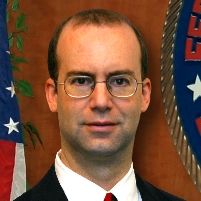Rural Utilities Service: Who is Jonathan Adelstein?
Tuesday, June 09, 2009

A Democrat who hails from South Dakota, Jonathan S. Adelstein has spent the past seven years serving as a member of the Federal Communications Commission (FCC), advocating for greater Internet services for rural America. As the head of the Rural Utilities Service, Adelstein will be in a position to distribute $2.5 billion in grants to promote greater broadband access for small towns across the country.
Adelstein was born in 1962 and raised in Rapid City, South Dakota, along with his two brothers, Dan and Jim. His mother, Ita, escaped from Nazi-occupied Poland during World War II and eventually settled in the United States, where she met Stan Adelstein. Stan ran his own engineering business and was twice elected to the South Dakota House of Representatives as a Republican. His son, Jonathan, lost faith in the Republican Party during the Watergate hearings of 1974, and eventually became a Democrat.
Adelstein attended prep school at Phillips Academy Andover, before going to Stanford University, where he received his Bachelor of Arts in political science and his Master of Arts in history. He became a leader in student government and the anti-nuclear movement on campus during his days at Stanford. While working on his masters, he worked as a teaching assistant in the history department, and later served as a communications consultant to the Stanford Graduate School of Business.
Adelstein then moved on to Harvard University, where he enrolled in a dual degree program at the John F. Kennedy School of Government, intending to get a law degree. He also worked as a teaching fellow in the history department. But he became disillusioned with the academic approach to policymaking, and left Harvard before completing law school.
He made his way to Washington, DC, and wound up working in the U.S. Senate for the next 15 years. He first worked as a legislative assistant to Senator Donald W. Riegle, Jr. (D-MI), followed by an assignment as a special liaison to Senator Harry Reid (D-NV) on the Senate Special Committee on Aging, chaired by Sen. David Pryor (D-AR). At one point Adelstein almost lost that job when Reid sponsored an amendment to abolish the committee—a move that so angered Pryor that he threatened to retaliate by axing Reid’s staff support on the committee, namely Adelstein. However, cooler heads prevailed before Adelstein found himself unemployed.
In 1995, he joined the staff of Senate Majority Leader Tom Daschle (D-SD) as a senior legislative aide providing advice on telecommunications, financial services, housing, and transportation, among other issues.
While working in Washington, Adelstein met Republican Karen Brenner, an Illinois native and health-care policy analyst. The two began dating, and were married in 1998. They have two children.
Adelstein’s seven years working for Daschle helped him receive an appointment to the FCC in 2002, after the Senate leader recommended him to President George W. Bush. Most observers thought the Senate would approve the appointment quickly, but they were wrong. After the Democratic-controlled Senate Judiciary Committee rejected one of President Bush’s judicial nominees on a party-line vote, Sen. Trent Lott (R-MS) announced that he would oppose Adelstein’s nomination. Publicly, Lott said that Adelstein, then 39 years old, was too young and inexperienced.
Adelstein’s supporters pointed out that the FCC’s chairman, Michael Powell, the son of Secretary of State Colin Powell, had been appointed to his position at the age of 37. Nevertheless, Lott successfully blocked Adelstein’s confirmation for months, despite the bipartisan efforts of South Dakota’s congressional delegation and Republican Gov. Bill Janklow’s support. The stonewalling ended only after the Republicans regained control of the Senate in November 2002.
Adelstein’s supporters pointed out that the FCC’s chairman, Michael Powell, the son of Secretary of State Colin Powell, had been appointed to his position at the age of 37. Nevertheless, Lott successfully blocked Adelstein’s confirmation for months, despite the bipartisan efforts of South Dakota’s congressional delegation and Republican Gov. Bill Janklow’s support. The stonewalling ended only after the Republicans regained control of the Senate in November 2002.
Adelstein received a second term in December 2004. While serving on the FCC, he has sought to improve rural telecommunications and broadband services. He also helped expand the Rural Utilities Service’s authority to finance broadband services in the 2002 Farm Bill.
Adelstein will not leave the five-member FCC until at least one of the three commissioner vacancies is filled, since his departure would leave the FCC without a quorum.
-Noel Brinkerhoff
Jonathan Adelstein Makes a Name for Himself on the FCC (by Eric John Abrahamson, Rapid City Journal)
Rural Utilities Service (AllGov)
- Top Stories
- Unusual News
- Where is the Money Going?
- Controversies
- U.S. and the World
- Appointments and Resignations
- Latest News
- Trump to Stop Deportations If…
- Trump Denounces World Series
- What If China Invaded the United States?
- Donald Trump Has a Mental Health Problem and It Has a Name
- Trump Goes on Renaming Frenzy






Comments